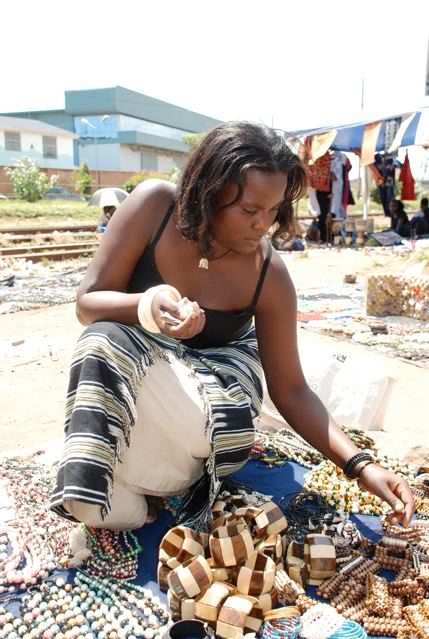…. who just happens to be one of my favorite authors, and one of Africa’s most distinguished writers.

Following is a conversation between Ikem and Beatrice (BB), two character’s in Achebe’s book Anthills of the Savannah.
“Ikem: ‘One of the things you told me was that my attitude to women was too respectful.’
Beatrice: ‘I didn’t.’
‘You bloody well did. And you were damn right. You charged me with assigning to women the role of a fire-brigade after the house has caught fire and been virtually consumed. Your charge has forced me to sit down and contemplate the nature of oppression - how flexible it must learn to be, how many faces it must learn to wear if it is to succeed again and again.’
He dug his hand into his shirt pocket and pulled out a folded sheet of paper and carefully unfolded it on his knee. ‘I wrote this strange love-letter last night. May I read it?” I nodded.
“The original oppression of Woman was based on crude denigration. She caused Man to fall, so she became a scapegoat. No, not a scapegoat which might be blameless but a culprit richly deserving of whatever suffering Man chose thereafter to heap on her. That is Woman in the Book of Genesis. Out here, our ancestors, without the benefit of hearing about the Old Testament, made the very same story differing only in local color. At first the Sky was very close to the Earth. But every evening Woman cut off a piece of the Sky to put in her soup pot, or in another version, she repeatedly banged the top end of her pestle carelessly against the Sky whenever she pounded millet or, as in yet another rendering—so prodigious is Man’s inventiveness, she wiped her kitchen hands in the Sky’s face. Whatever the detail of Woman’s provocation, the Sky moved away in anger, and God with it.
‘Well, that kind of candid chauvinism might be ok for the rugged taste of the Old Testament. The New Testament required a more enlightened, more refined, more loving even, strategy—ostensibly that is. So the idea cam to Man to turn his spouse into the very Mother of God, to pick her up from right under his foot where she’d been since Creation and carry her reverently to a nice, corner pedestal. Up there, her feet completely off the ground, she will be just as irrelevant to the practical decisions of running the world as she was in her bad old days. The only difference is that now Man will suffer no guilt feelings; he can sit back and congratulate himself on his generosity and gentlemanliness.
‘Meanwhile, our ancestors out here, unaware of the New Testament, were working out independently a parallel subterfuge of their own. Nneka, they said. Mother is supreme. Let us keep her in reserve until the ultimate crisis arrives and the waist is broken and hung over the fire, and the palm bears its fruit at the tail of its leaf. Then, as the world crashes around Man’s ears, Woman in her supremacy will descend and sweep the shards together.
‘Do I make sense?’
‘As always. Go on.’
‘Thank-you, BB. I owe that insight to you. I can’t tell you what the new role for Woman will be. I don’t know. I should never have presumed to know. You have to tell us. We never asked you before. And perhaps because you’ve never been asked you may not have thought about it; you may not have the answer handy. But in that case everybody had better know who is now holding up the action.’
‘That’s very kind of you!’
‘That was the first part of this love-letter, the part I owe specifically to you. Here’s the rest.
‘The women are, of course, the biggest single group of oppressed people in the world and, if we are to believe the Book of Genesis, the very oldest. But they are not the only ones. There are others - rural peasants in every land, the urban poor in industrialized countries, black people everywhere including their own continent, ethnic and religious minorities and castes in all countries. The most obvious practical difficulty is the magnitude and heterogeneity of the problem. There is no universal conglomerate of the oppressed. Free people may be alike everywhere in their freedom but the oppressed inhabit each their own peculiar hell. The present orthodoxies of deliverance are futile to the extent that they fail to recognize this. You know my stand on that. Every genuine artists feels it in his bone. The simplistic remedies touted by all manner of salesmen (including some who call themselves artists) will always fail because of man’s stubborn antibody called surprise. Man will surprise by his capacity for nobility as well as for villainy. No system can change that. It is built into the core of man’s free spirit.
‘The sweeping, majestic visions of people rising victorious like a tidal wave against their oppressors and transforming their world with theories and slogans into a new heaven and a new earth of brotherhood, justice and freedom are at best grand illusions. The rising, conquering tide, yes; but the millennium afterwards, no! New oppressors will have been readying themselves secretly in the undertow long before the tidal wave got really going.
‘Experience and intelligence warn us that man’s progress in freedom will be piecemeal, slow and undramatic. Revolution may be necessary for taking a society out of an intractable stretch of quagmire but it does not confer freedom and may indeed hinder it.
‘Bloody reformist? That’s a term of abuse it would be redundant to remind you I have had more than my fair share of invoking against others across the years. But I ask myself: beyond the pleasant glow that javelin of an epithet certainly brings to the heart of the righteous hurler what serious benefit can it offer to the solution of our problems? And I don’t see any.
‘Reform may be a dirty word then but it begins to look more and more like the most promising route to success in the real world. I limit myself to most promising rather than only for the simple reason that all certitude must now be suspect.
‘Society is an extension of the individual. The most we can hope to do with a problematic individual psyche is to re-form it. No responsible psychoanalyst would aim to do more, for to do more, to overthrow the psyche itself, would be to un-leash insanity. No. We can only hope to rearrange some details in the periphery of the human personality. Any disturbance of its core is an irresponsible invitation to disaster. Even a one-day-old baby does not make itself available for your root-and-branch psychological engineering, for it comes trailing clouds of immortality. What immortality? Its baggage of irreducible inheritance of genes. That is immortality.
‘It has to be the same with society. You re-form it around what it is, its core of reality; not around an intellectual abstraction.
‘None of this is a valid excuse for political inactivity or apathy. Indeed to understand it is an absolute necessity for meaningful action, the knowledge of it being the only protective inoculation we can have against false hopes and virulent epidemics of gullibility.
‘In the vocabulary of certain racial theorists contradictions are given the status of some deadly disease to which their opponents alone can succumb. But contradictions are the very stuff of life. If there had been a little dash of contradiction among the Gadarene swine some of them might have been saved from drowning.
‘Contradictions if well understood and managed can spark off the fires of invention. Orthodox whether of the right or of the left is the graveyard of creativity.
‘I didn’t owe this insight to you, BB. I drank it in from my mother’s breast. All I’ve ever needed since was confirmation. “Do I contradict myself?” asked Walt Whitman. “Very well, I contradict myself,” he sang defiantly. “I am large, I contain multitudes.” Every artist contains multitudes. Graham Greene is a Roman Catholic, a partisan of Rome, if you like. Why then does he write so compulsively about bad, doubtful and doubting priests? Because a genuine artist, no matter what he says he believes, must feel in his blood the ultimate enmity between art and orthodoxy.
‘Those who would see no blot of villainy in the beloved oppressed nor grant the faintest glimmer of humanity to the hated oppressor are partisans, patriots and party-liners. In the grand finale of things there will be a mansion also for them where they will be received and lodged in comfort by the single-minded demigods of their devotion. But it will not be in the complex and paradoxical cavern of Mother Idoto.’
He tossed the handwritten paper across to me, saying ‘I must go,’ and beginning to put his shoes back on. I stared at the paper, at the writing - elegant but at the same time, immensely powerful. He got up. I got up too and walked up to him. Impulsively he circled me in his embrace. I looked up at him and he began to kiss me. Everything inside me was dissolving; my knees were giving way under me; I was trembling violently and I seemed to be struggling for air.
‘I think you better go,’ I managed to say. He released me slowly and I sank into a chair.
‘Yes, I’d better be going.’
And he was gone, not for now as I and perhaps he too thought, but for ever. The storm had died down without our having been aware of it. All that was left of it now were tired twitches of intermittent lightning and the occasional, satiated hiccup of distant thunder.”









